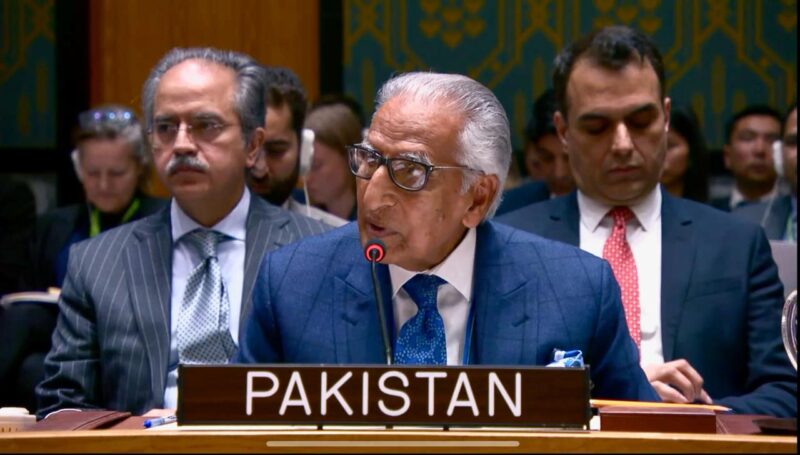By Mumtaz Hussain
UNITED NATIONS: Pakistan has called upon the United Nations Security Council (UNSC) to fulfill its responsibility by ensuring the implementation of its own resolutions on the Jammu and Kashmir dispute.
Special Assistant to the Prime Minister and Minister of State Syed Tariq Fatemi reminded the world forum that the Jammu and Kashmir dispute remains on the agenda of the UNSC and awaited a just and final settlement in accordance with its resolutions that promised to the Kashmiri people the right to self-determination through a UN supervised plebiscite.
He was speaking at the UN Security Council High-Level Open Debate on the “Maintenance of International Peace and Security: Advancing Adaptability in UN Peace Operations – Responding to New Realities”.
He told the international community that without resolving root causes of conflicts, durable peace cannot be ensured in the world.
It it is the responsibility of the Council to ensure the realization of right to Self-determination for the Kashmiri people, and promote a just and lasting settlement of the dispute by taking measures to implement its own resolutions.
Highlighting the importance of the UN peacekeeping operations as being cost-effective instruments to maintain international peace and security, he mentioned that the UN Military Observer Group in India and Pakistan (UNMOGIP), established in 1949, exemplified the observation and monitoring type of operations for inter-state conflicts.
He said that originally conceived for inter-state conflicts, peacekeeping operations have since also been applied in intra-state conflicts and civil wars.
Mr Fatemi mentioned Pakistan’s long association with UN peacekeeping operations in terms of being one of the longest serving and leading troop contributors and a founding member of the Peacebuilding Commission.
He added that over the years, Pakistan had deployed 235,000 peacekeepers in 48 Missions across the globe.
He noted, “181 Pakistani peacekeepers have paid the ultimate sacrifice in the service of international peace and security. More than 3,267 Pakistani men and women are proudly serving in blue helmets in 7 Missions today,” he explained.
Mr Fatemi highlighted the “new realities” and challenges facing peace operations today, which, he said, are being increasingly shaped by (i) divergent objectives and priorities resulting from increased geo-political rivalries; (ii) lack of political will; (iii) insufficient allocation of resources; (iv) proliferation of non-state actors; (v) changing nature of conflicts; and (vi) weaponization of new technologies and the information space.
He shared Pakistan’s suggestions to make UN peacekeeping more dynamic and capable of responding to contemporary challenges:
• Stronger political commitment from UN Member States, particularly the Security Council, to prevent negative actors from exploiting power vacuums.
• Clear, realistic, and situation-specific mandates for peacekeeping missions.
• Primacy of political solutions, ensuring peacekeeping operations support well-defined political objectives.
• Adequate financial resources to match growing operational demands.
• Modern training, equipment, and resources to counter emerging threats.
• Well-planned mission transitions and withdrawals, ensuring stability and civilian protection.
• Early peacebuilding initiatives within peacekeeping operations to foster long-term stability.
• Meaningful consultations with troop-contributing countries in shaping the future of UN peace operations.
Mr. Tariq Fatemi noted that the UN Security Council did not mandate any new peacekeeping operation in over a decade despite the apparent need, and urged the Council to not shy away from utilizing this significant tool for maintenance of peace in conflict zones.
He said Pakistan is closely engaged at the policy and conceptual level in responding to the evolution of UN Peacekeeping, adding that his country is hosting the UN Peacekeeping Ministerial preparatory meeting in Islamabad next month, whose outcomes would feed into the ongoing deliberations on the future of UN Peace Operations.


Comments are closed.